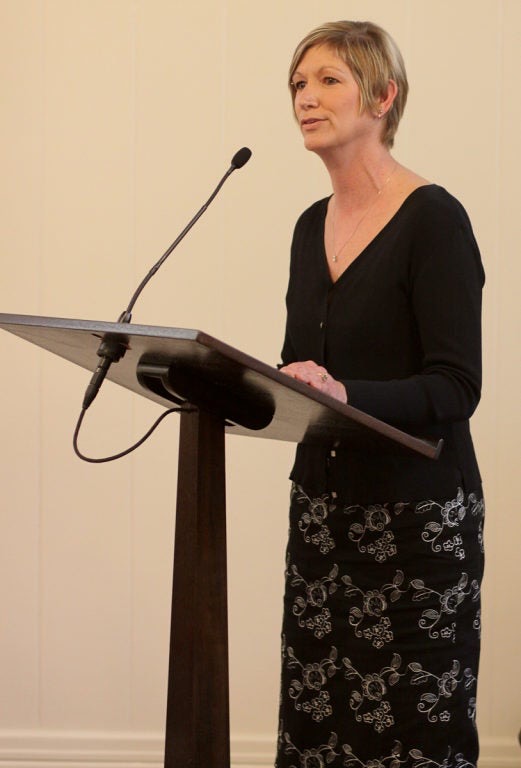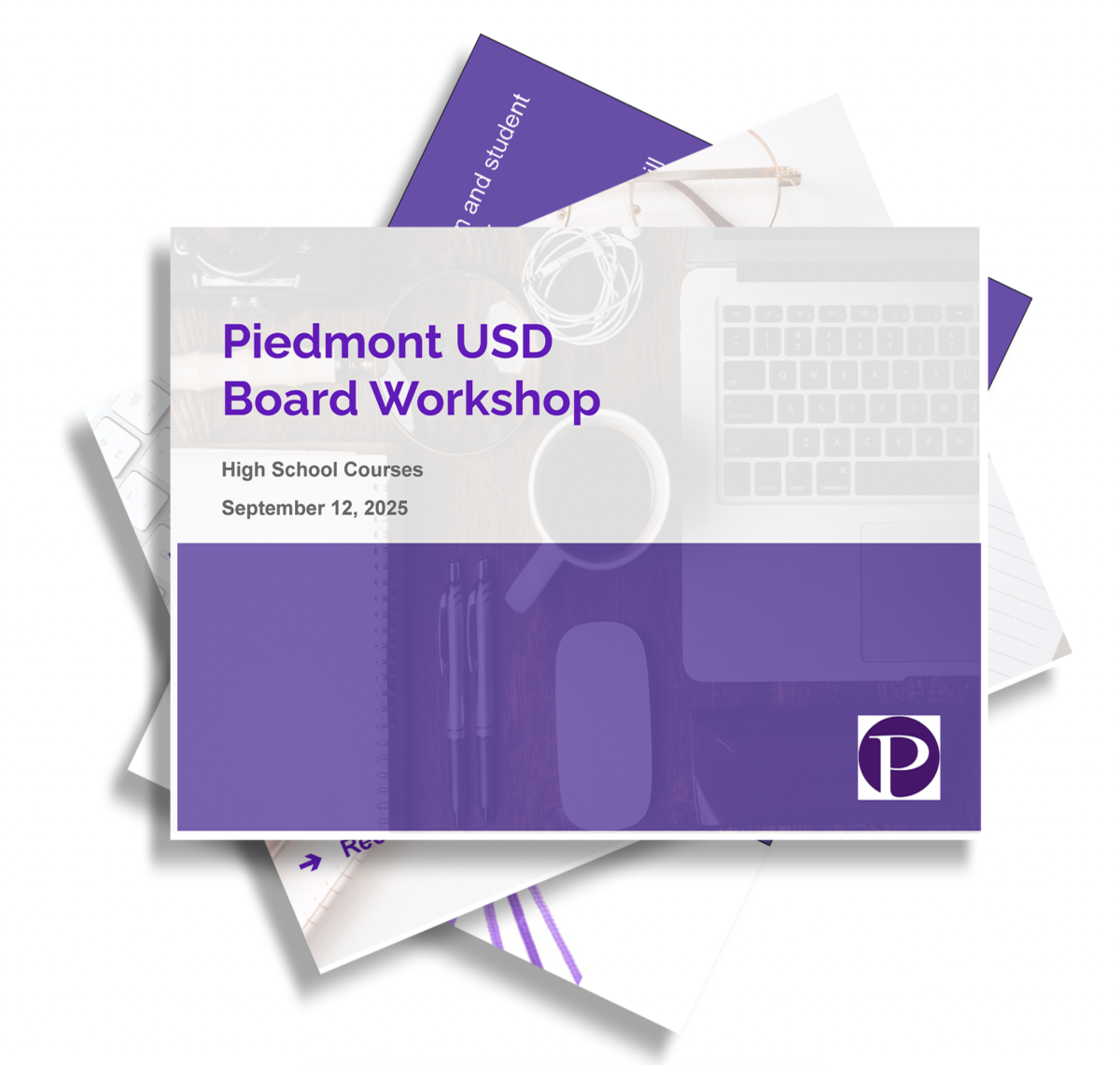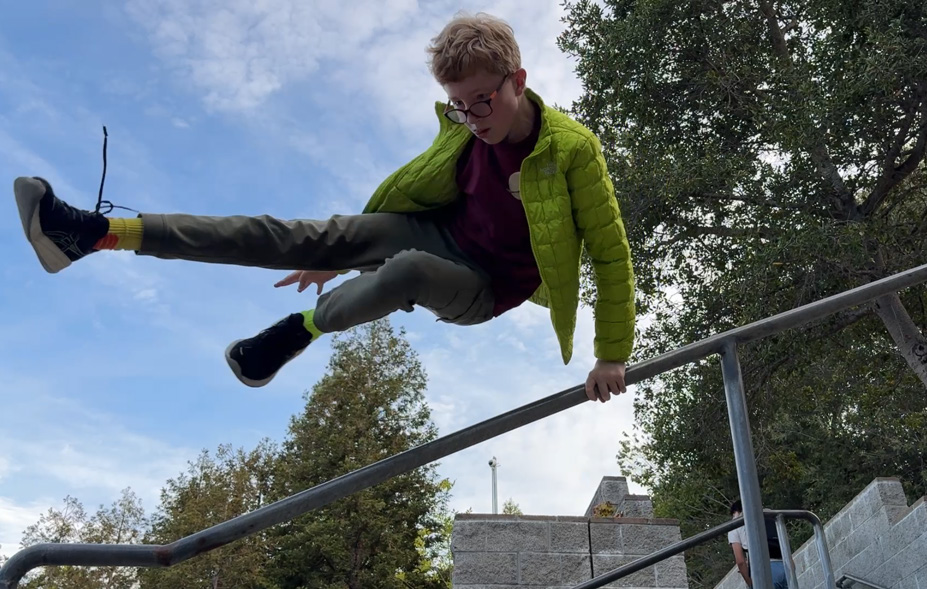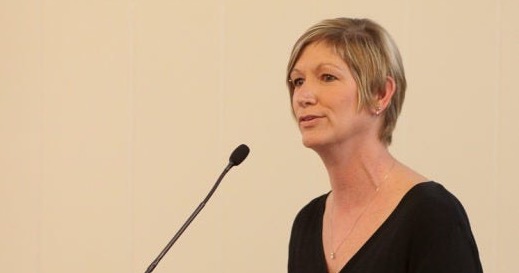On Wednesday, April 21, Piedmont Unified School District (PUSD) assistant superintendent Cheryl Wozniak sent three emails to PHS and MHS students, including one with the subject line “White Student Support Circle.”

The email immediately received backlash and prompted a subsequent apology. News of the email spread beyond the Piedmont community when students posted TikToks and news organizations across the country picked up the story.
The day before the email, on April 20, former Minneapolis police officer Derek Chauvin was found guilty of second-degree murder, third-degree murder and second-degree manslaughter in the death of George Floyd, a Black man, according to the New York Times. Floyd's murder had made national headlines in 2020, sparking protests against police brutality, in particular violence perpetrated by white police officers against Black people.
Following Chauvin’s trial and verdict, PUSD assistant superintendent Cheryl Wozniak sent three emails to PHS and MHS students: the first was with the subject line “African-American/Black Student Support Circle,” the second with the subject line “BIPOC Student Support Circle,” and a final email with the subject line “White Student Support Circle.” According to the emails, Wozniak sent them on behalf of restorative justice coordinator Ina Bendich and Havens paraeducator Jean Takazawa. Bendich and Takazawa also serve as the staff coordinators of the Piedmont Affinity and Identity Mentor Program, an organization connecting BIPOC high school students with local elementary schoolers.
“We are offering a restorative community circle [on given dates and times] to support African-American and Black students who would like to discuss how the trial, verdict, and experiences related to the George Floyd murder are impacting you,” the first email said. In the second email, “African-American and Black” was replaced with “BIPOC,” and in the third email, it was replaced with “White.”
Wozniak said the idea to create these support circles came the weekend before the verdict of Chauvin’s trial was released. Wozniak was inspired by the Asian American Pacific Islander (AAPI) student circles which took place in the aftermath of the Atlanta shooting in March. She reached out to Bendich and Takazawa to discuss the idea.
“I got to hear that [the AAPI student support circles] were so helpful and that students appreciated that space to process,” Wozniak said.
Bendich said that the idea was to provide separate groups so that students felt they were in a safe place to talk and reflect. Takazawa and Bendich decided that there should also be a discussion for white students, but it would be set up differently than the circles for Black and BIPOC students.
“[Takazawa] and I knew that we were not going to do the same thing for white students that we were going to do for everybody else,” Bendich said. “That was very clear to us. Our thinking was [to do] an ally workshop kind of thing, providing them with information perhaps with some education around what it means to be an ally.”
Wozniak said that when Bendich and Takazawa wanted to hold the circles for AAPI students, Wozniak created a Google Form. She sat down to send the emails on the evening of April 21 and decided to use the same format for the three new support circles.
“I made a copy of [the AAPI support circle] Google Form,” she said. “I replaced ‘AAPI’ with ‘African American and Black students’ and sent that out.”
Then, Wozniak said that she took a dinner break. In the following email, she replaced “African American and Black students” with “BIPOC students.”
“Then, I got to the white students, and I remember replacing [‘BIPOC’ with ‘White’] and actually sitting there late at night alone thinking, ‘Well, do I send this?’” she said.
In the end, Wozniak said she sent it because she believed that not sending it would send a message that there was no work to be done for white students.
Wozniak said that she started receiving feedback within minutes of sending the email, including a student asking how white people could build empathy if they were in their own group. Other students and members of the community also contacted her, hurt and angered by the messages.
MHS senior and Black Student Union (BSU) leader Harmonee Ross said that she was in no way surprised by the “White Student Support Circle” email because her own experience with PUSD staff has not reflected a place that honors racial equality.
“Hearing frustrations from [sophomore and BSU leader] Sage Mosley and other students of color broke my heart because we all felt like white people’s pain was put on the same level as Black people,” Ross said.
Senior Athene La Jeunesse said that she is losing hope that the PUSD administration will be self-aware of how unsafe they have made the school district for BIPOC students.
“I’m very disappointed that the two women of color, [Bendich and Takazawa], were getting blowback for a mistake a white woman [Wozniak] made,” LaJeunesse said. “This incident was not a minor mistake in an otherwise stellar track record. This incident was another let down in a long history of mistakes and damage.”
On Thursday, April 22, the day after the initial emails were sent, Wozniak sent a follow up email with the subject line “Apology and Clarification for Support Circles.”
“I apologize for the harm my previous communication where I used the language “support circle for white students” has caused the students of color in our community,” Wozniak wrote in the email. “I did not make it clear that the circle being offered by [Bendich] and [Takazawa] is for those who want to be allies for BIPOC, and consequently, I have learned that the impact on our students of color has left them feeling hurt and disrespected by district administration.”
Bendich and Takazawa also contributed to the email, writing, “This is really a snapshot of how harmed our students of color have been by white people and the immense distrust they have for the system and structures that perpetuate white supremacy.”
In addition, PUSD superintendent Randall Booker sent an email with the subject line “PUSD’s Commitment to Racial Justice” on Friday, April 23.
“A poor choice of words in the subject line of the invitation to White students led to the perception that White students needed the same kind of “support” as our BIPOC students,” Booker wrote in the email.
Ross said that she felt that the apology from Wozniak was damage control and lacked an understanding of the pain that was inflicted.
“After the previous apology emails were sent out, Ross and I received a private apology letter from Wozniak talking about how she will continue to make mistakes,” Mosley said. “I believe that was unacceptable to say, and it undermines the impact of what happened.”
Senior Lynnea Bao said that this situation was completely preventable.
“This kind of stuff can’t keep happening because at the end of the day, it’s not the responsibility of the admin to fix it or clean up,” Bao said. “My advisors, [Takazawa and Bendich, or] student affinity groups are going to be asked to clean up after it.”
Students began posting about the emails on social media platforms, spreading word of the situation beyond the Piedmont community. Junior Suey Barrett posted a TikTok with a screenshot of the “White Student Support Circle” email which has received over 257.2 thousand views and 87.6 thousand likes.
Update: As of May 21, Barrett's TikTok has been deleted, along with his other videos on the account.
“I made the TikTok because I felt like as a community we should be talking about these issues together with whoever felt impacted,” Barrett said.
The TikTok received a variety of responses, he said.
“Some people really seemed like they cared about the issue and felt that the intentions weren’t bad, but the idea was poorly executed,” Barrett said. “Others were straight up outraged.”
News organizations such as Fox KTVU 2, Newsweek, and Kron4 picked up the story. Wozniak said that she was contacted directly by news organizations.
On Monday, May 7, CNN also reported on Wozniak’s email in a segment entitled “Race in America” on their “Early Start” morning news show.
“I don’t have experience with the media like that, so I felt like I really needed support, so I contacted [Booker],” Wozniak said. “He advised me not to respond and he has responded to the media himself so that I could just do the work within our community.”
Other social media users also took to online platforms to express their anger. “Don’t try to back peddle now,” one user said under TPH’s Facebook update regarding the continuation of Black and BIPOC support circles. “The email Cheryl Wozniak sent was utterly racist and disgusting. What has been done about her? Please don’t patronize us by telling us it was a mistake.”
Because the story spread beyond Piedmont, Wozniak said she received emails from outside of the community, some of which were threatening.
“I felt a huge range and flood of emotions including deep sadness for the harm that was caused, embarrassment, and some fear because at that point, things shifted in the communications [to be more threatening],” she said. “And I felt a deep responsibility to do something, to take action to try and turn this around.”
Wozniak said that although there is tons of racial justice work to be done outside of Piedmont, she is committed to starting here in PUSD and wants to focus her energy on creating conversation within the community.
Takazawa said that this reaction to the email is a response to a large fracture in the community between students of color and administration.
“How big this got is a representation of that fracture and that we can’t ignore it now, it’s in our faces,” she said.
Future circles should be planned with student input, Wozniak said.
“What I realized was that something like that needs to be planned by a larger team of people to get more education and communication out to ensure that when that protocol happens, people who are coming [to the support circles] know what they are signing up for,” Wozniak said.
Takazawa said that it is important to bring something productive out of this situation and it is Takazawa, Bendich, and Wozniak’s goal to land in a place where there is healing and restoration. Although the white student support circle was canceled, the Black and BIPOC student support circles were held and were very productive, Takazawa said.
“I hope to not let this error of mine shut people down to the point where they disengage or stop believing in the work of the adults in this community to show up and do the work,” Wozniak said.
Credits:
Written by editor-in-chief Aya Troyer
Additional research by editor-in-chief Anthony Wong and managing editor Malia Lee
Additional interviews by TPH Editorial Board and staff writers
Web layout by editor-in-chief Anthony Wong and multimedia editor Graham Reicher




























